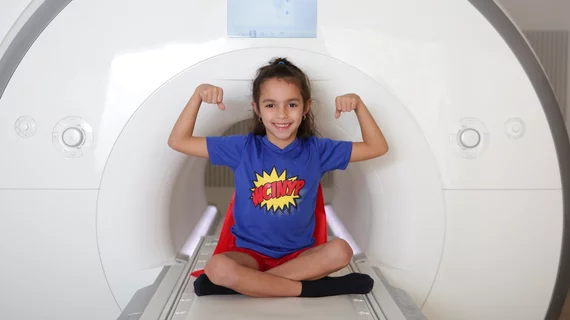Augmented reality bear helps calm pediatric patients undergoing MRI exams
A radiology department in California makes use of an innovative augmented reality bear to help children through MRI exams.
“Choco” is the mascot of Children’s Health of Orange County (CHOC). The bear is part of the hospital’s augmented reality app that children can use throughout the duration of their MRI scan to ease their anxiety and minimize motion.
Similar to the popular Pokemon Go app, Choco appears before patients in their environment through a tablet in real time. The animated bear explains procedures by using informative games and breaking down the basics in a way that is understandable to children. Choco describes the procedure and room (including pointing out where the gowns are) and introduces patients to staff members involved in their exam.
“It benefits the patients overall, and it benefits the technologists as well, because it helps prepare the child so they are not moving or they are not anxious or claustrophobic,” Ruiz told the Orange County Register. “And the trifecta is that it better prepares the parent on what is about [to] happen.”
The app uses various animated scenery, including sandcastles and floating pink donuts, to walk children through the MRI department, and includes a scene where Choco himself undergoes an MRI scan. After the procedure, Choco offers congratulations and celebrates with the patient.
“The more prepared you are when it comes to imaging services, especially in pediatrics, the more prepared the patient is and the more likely they are to get through the exam and not move,” said Andrew Ruiz, CHOC’s director of imaging services. “For us to be able to get the highest quality imaging, I think that is one of the more important aspects of this that we focused in on.”
The app is the result of a collaboration between the team at CHOC’s Sharon Disney Lund Medical Intelligence and Innovation Institute (MI3) and EON Reality, a virtual and augmented reality software developer based in Irvine, California. The educational and interactive app is still in its pilot phase, but is expected to be more widely available soon, according to the Orange County Register.
More on pediatric imaging:
Diffusion tensor imaging of the knee predicts pediatric bone growth
Deep learning-based reconstruction reduces pediatric CT dose by 54%, maintains image quality
Cooperation during pediatric MRIs improves with parental participation, study shows
Do MIS-C abdominal symptoms resolve? New research tracks follow-up ultrasound findings

